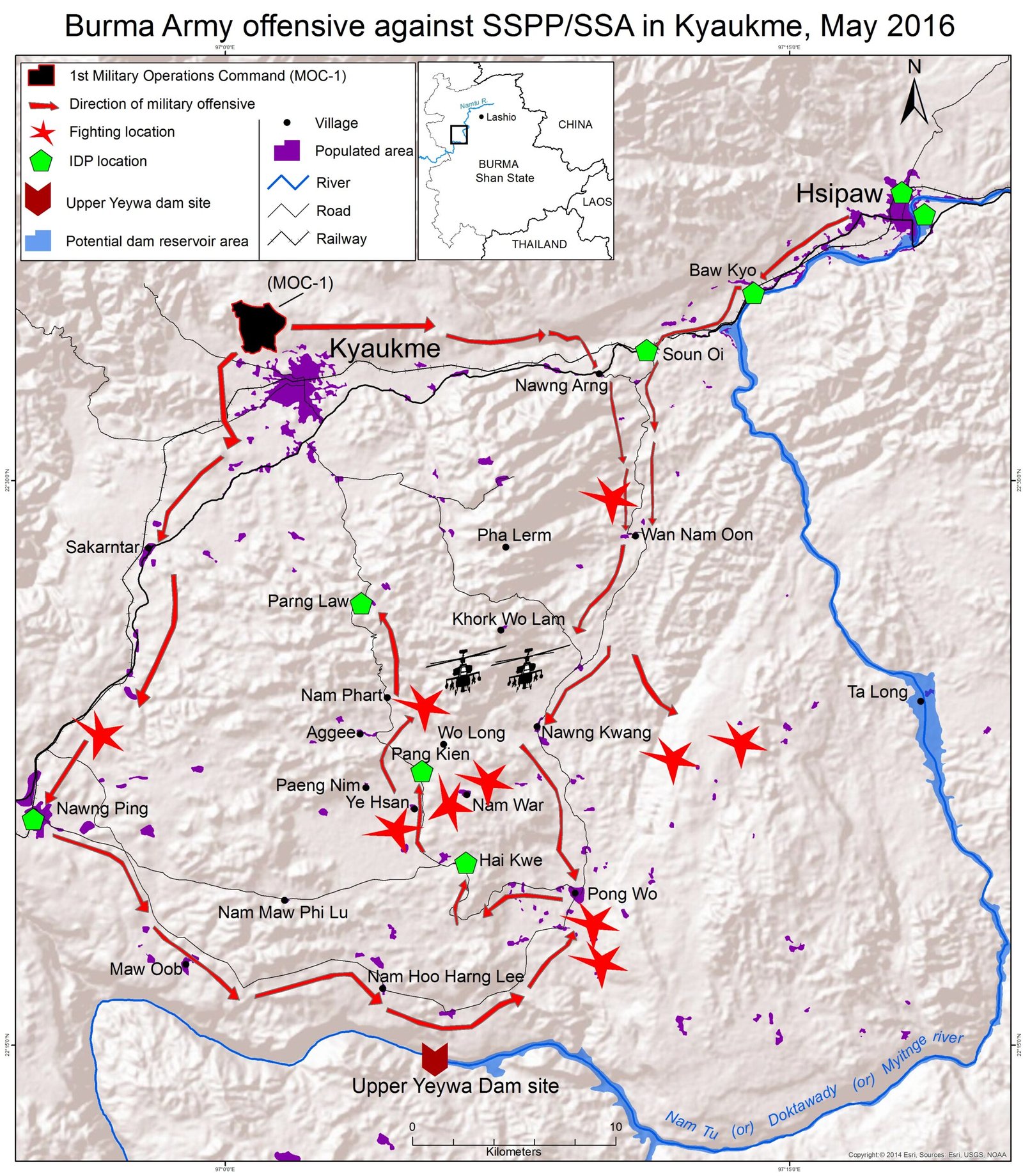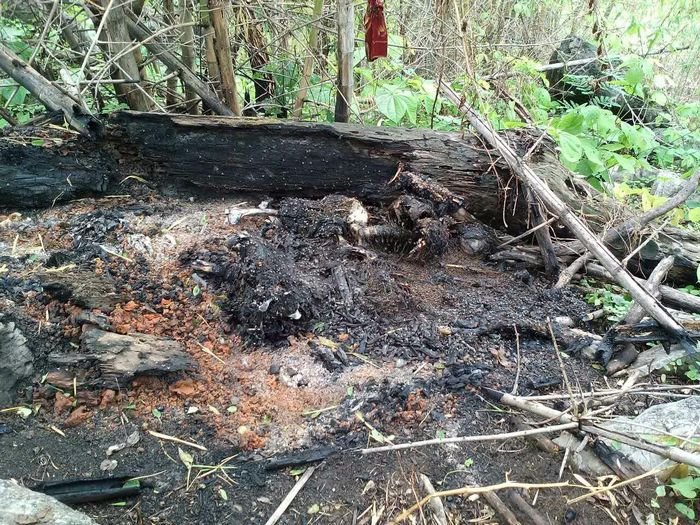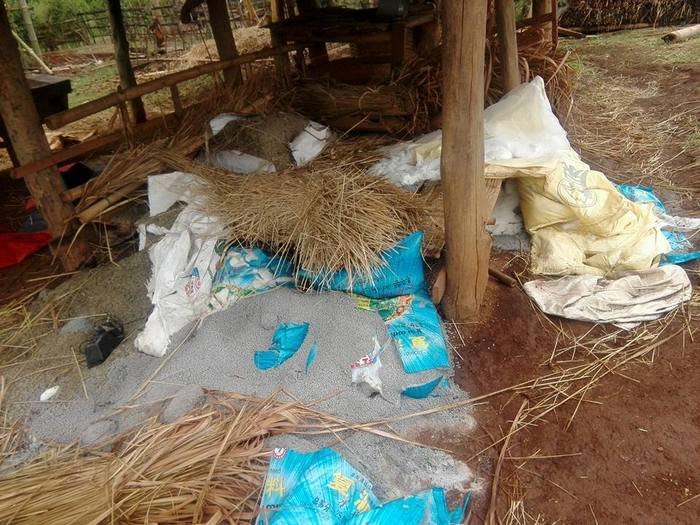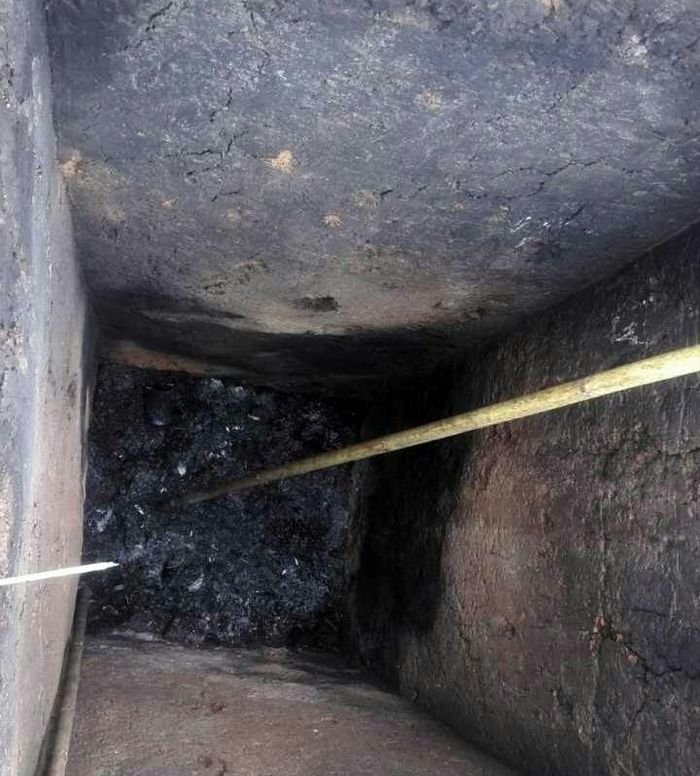Update by the Shan Human Rights Foundation
June 1, 2016
Torture, extrajudicial killing, and use of civilians as human shields by Burma Army during new offensive against SSPP/SSA near Upper Yeywa dam site in Kyaukme
During May 2016, the Burma Army has committed grave human rights violations, which meet the definition of war crimes, during a new offensive against the Shan State Progress Party/Shan State Army (SSPP/SSA) in Kyaukme township, northern Shan State, close to the Upper Yeywa dam site on the Namtu/Myitnge river.
On May 3, 2016, without warning, about 500 troops from four Burma Army battalions (LIB 325, 502, 503 and 114) launched an attack on SSPP/SSA administered areas south of Kyaukme town, despite the fact that SSPP/SSA has an existing ceasefire with the Burmese government, and has been operating there for decades.
After over a week of heavy fighting, the Burma Army sent in helicopter gunships on May 13, which dropped bombs around eight villages, and by mid-May about 1,000 Burmese troops had occupied most of the area (with reinforcements from IB 23, LIB 501, 504, 115 and 17). Over 1,000 villagers were displaced by the offensive.
Grave human rights violations by the Burma Army during this offensive include the use of 43 villagers, including women, as human shields; severe torture of 5 villagers; and extrajudicial killing of at least 3 civilians, with 5 other bodies yet to be identified.
The following is a summary of the violations:
| Date | Victim | Type of violation | Location of violation |
| May 11-12, 2016 | 30 villagers (including women) | Use of civilians as human shields | From Nam Oon village to Pha Learm village, Kyaukme |
| May 13, 2016 | 1 villager, now mentally deranged | Aerial bombing, shooting at civilian target | |
| May 14, 2016 | 5 villagers | Arbitrary arrest, torture, forced portering | Nam Phart village, Kyaukme |
| May 14, 2016 | 3 villagers (1 already wounded) | Extrajudicial killing (corpses burned) | |
| May 14, 2016 | Destruction of villagers’ food stores and other property; burning of 2 houses | Nam Phart, Agee and Wo Long villages, Kyaukme | |
| May 18-19, 2016 | 6 villagers | Use of civilians as human shields | From Parng Law village to Nawng Kwang village, Kyaukme |
| May 20-21, 2016 | 6 villagers (incl. village head) | Use of civilians as human shields | From Nawng Kwang village to Nam War village, Kyaukme |
| May 20, 2016 (bodies found) | 5 people (still unidentified) | Extrajudicial killing (corpses burned) | Wo Long village, Kyaukme |
SHRF strongly condemns these violations, which meet the definition of war crimes, and calls for an end to impunity for the perpetrators.
It is urgently needed for the international community to publicly denounce the ongoing offensives and war crimes by the Burma Army, which make a mockery of the peace process. SHRF regrets that the EU diplomatic delegation which visited Hsipaw (east of Kyaukme) on May 16, laid no blame on the Burma Army for the fighting, and made no mention of their ongoing atrocities.
SHRF also wishes to highlight the proximity of the fighting to the Upper Yeywa dam site. Locals have voiced strong opposition to the project, and a likely reason for the latest offensive was to seize control of the area to provide security for ongoing construction. We reiterate our calls to international companies involved in this and other dams on the Namtu — including Swiss, German, Norwegian, Japanese and Chinese companies — to immediately suspend their involvement or risk complicity in the abuses committed by the Burma Army to clear the way for the dams.

Burma Army offensive against SSPP/SSA in Kyaukme, May 2016
Details of human rights violations committed by Burma Army troops in Kyaukme township, May 11-20, 2016
30 villagers forced to be human shields for Burma Army
On May 11, about 100 Burma Army troops arrested 30 villagers of Nam Oon Nar Mon, Koong Nio tract, and ordered them to lead them to Pha Learm village. They were forced to march ahead of the troops.
They set off at 7 am on May 11, and walked all through the day and night, till they reached Pha Learm at 9 am the following morning, and they were released. They were not given any food or water along the way. Some were made to carry the backpacks of the Burmese soldiers.
Aerial attack targets civilian
On May 13, 2016, a 60-year-old farmer was shelled and shot at from a Burma Army helicopter, causing him to become mentally deranged.
On that day, Loong Aung Tun, from Aggee village, Hai Gui village tract, had gone to tend his farm outside the village. When he heard the sound of helicopters flying above, he ran out from his farm hut to look at them. Troops in a helicopter saw him and dropped 3 bombs around him, and also fired a machine gun at him. Fortunately, he was not hit, but was badly shocked. He ran back to his family and told them what had happened, but has since become so mentally disturbed that he cannot even recognize his own family members. He is married, with two children.
Five villagers tortured by beating and electric shocks, and forced to be porters
On May 14, 2016, Burmese soldiers from LIB 504 arrested and tortured five villagers, detaining them for two nights, and also using them as porters. The five villagers were:
- Sai Cing, aged 28, from Aggee village
- Sai Pancitta, aged 36, from Aggee village.
- Sai Nandiya, aged 36, from Aggee village
- Loong Maung Kan, aged 40, from Aggee village.
- Sai Sujaya, aged 45, from Nam Phart village.
Most of the villagers of Aggee had already fled to take shelter in Parng Law monastery since May 12-13, but four Aggee villagers — Sai Shing, Sai Pancitta, Sai Nandiya and Loong Maung Kan – had stayed to look after their houses. However, when they heard the sound of heavy fighting and bombing early on May 14, they decided to leave their homes and take shelter at Parng Law. As they were walking in front of Nam Phart temple, at about 8 am, they were arrested by Burmese soldiers. There were about 100 soldiers staying in Nam Phart at the time.
At around the same time, Sai Sujaya, a villager from Nam Phart, who had already fled to Parng Law, was returning to untie his cattle at his home, but was captured by the Burmese troops as he was passing near the Nam Phart temple.
The five villagers were kicked and beaten with sticks and rifle butts; they were also cut with knives. They were asked about their contact with Shan soldiers, and whether they had supported them with food and money.
Two of the villagers, Sai Nandiya and Sai Sujaya, were also electrocuted on their bodies, using wires attached to a battery.
The villagers had their hands tied behind their back, and were blindfolded with women’s sarongs. They were kept in the temple kitchen for two nights, without any food or water.
Sai Nandia described his experience: “The Burmese troops used a knife to cut my neck many times. They used rifle butts to hit my face, nose, cheeks and mouth. And they used electric wires from a battery to give me a shock in my back, my right shoulder, and my chest. They hit my shins with a rifle butt and tied my feet and hands. They blindfolded my eyes. At that time, my mouth was bleeding. All my clothes were wet with blood. My eyes were hurt. We were not allowed to sleep for two nights.”
On the morning of May 16, still blindfolded, they were forced to porter for the Burmese soldiers, each carrying bags weighing about 10 kg. They were made to walk from Nam Phart temple to Parng Law temple (about 5 kilometers), after which their blindfolds were finally taken off. They were only released when some of the local Parng Law villagers and a monk, were able to guarantee they were really villagers, not Shan soldiers.
Sai Nandiya was admitted to Kyaukme hospital because he had been so seriously injured from the torture.
Extrajudicial killing of three villagers
The burned remains of three villagers were found south of Parng Law village on May 19, 2016, after they were witnessed being arrested by the Burma Army on May 14, 2016.
All three men were from Nawng Kwang village. Their names are as follows:
| Name | Age | Parents’ names | Family | |
| 1 | Sai Aik Naung (a.k.a.) Ar Jin Na
ID no:13/KaMaNa(Nai)110825 |
27 | Loong Pang,
Ba Nging |
Wife: Aye Kham Sar (23)
1 son (10 months) |
| 2 | Sai Aik Mart
(brother of Sai Aik Nount) ID no: 13/KaMaNa(Nai)090608 |
30 | Loong Pang ,
Ba Nging |
Wife: Aye Bu (23)
3 sons (age 7, and 2 twins age 3) |
| 3 | Sai Aik Dink (a.k.a.) Sai Su
(cousin of Sai Aik Nount and Sai Aik Mart) ID no: 13/KaMaNa(Nai)130401 |
26 | Loong Kho,
Ba Nang Uoi |
Wife: Aye Kham Bu |
On May 13, Sai Arjina was shot and wounded in the neck while delivering food to SSPP/SSA troops during fighting with the Burma Army close to Aggee village. He had a mobile phone and called to his relatives to come and help him. On May 14, his elder brother, Sai Aik Mart, and their cousin Sai Aik Dink, rode on a motorcycle to go and fetch him. They picked him up, and were riding back near Nam Phart village, when they were stopped and arrested by Burmese soldiers. This was witnessed by some villagers in Nam Phart.

On May 19, six villagers from Parng Law village, who had been forced to guide Burmese troops to Nawng Kwang village, were walking back home, when they came across the charred remains of three bodies at Mark Moan Karn Lieng (Red Mango Hill), between Nam Phart and Parng Law. When they got to Parng Law, they informed some village leaders, who realized the bodies might belong to the three men from Nawng Kwang who had been arrested on May 14. They rang through to Nawng Kwang village leaders, and on May 19, some of the villagers drove a truck to go and see the remains. They were able to identify the three men by the hats they had been wearing. They left the remains until the next day, May 20, when they returned and picked up the bones, taking them to Parng Law temple. On May 21, a small ceremony was performed for the dead men.
Destruction of food stores and property in three villages
On May 14, Burma Army troops stationed in Nam Phart village (which has 40 households) went from house to house, breaking down doors, and destroying food stores. They emptied sacks of rice and corn, as well as fertilizer, scattering them on the ground. They also put salt in the engine oil of motorcycles in the village. This was witnessed by a monk at the temple.
During May 14-16, Burmese troops did the same in Aggee village (25 households) and Wo Long village (32 households). In Wo Long village, two houses were burned down, and motorbikes and a small ploughing machine/tractor were also destroyed.
Six villagers forced to be human shields for Burma Army
On May 18, 6 villagers from Parng Law village were forced by Burma Army troops to lead them to Nawng Kwarng village, a distance of about 9 miles.
They were forced to walk ahead of about 100 troops, throughout the night. They were not given any food or water. They were released the next day, May 19, in Parng Law village.
Six villagers forced to be human shields for Burma Army
On May 20, 5 villagers and the village administrative head, U Dae Win, from Nawng Kwang village, were forced by about 100 Burma Army troops to lead them to the village of Nam War. They left Nawng Kwang at about 2 am in the morning, and arrived in Nam War at 5 am the next morning, May 21. They were not given any food or water. They were then released and allowed to return home.
The names of two of the villagers are: Sai Myint, age 35, and Sai Zan Di Mar, age 32.
Five burned bodies found in Wo Long village
On May 12-13, 2016, there was heavy fighting near Wo Long village. During that time, most Wo Long villagers fled their homes, many taking refuge in Parng Law temple.

When villagers returned to their homes on May 20, after the fighting had died down, they found that their homes and property had been damaged, and that two houses had been burned down. In the charred remains of one of the houses, belonging to a medic called Loong Saw Bay Da, two burned bodies were found.
Behind the home of Loong Htoon Awng, in the latrine pit, two other burned bodies were found.
Another burned body was found outside the village, about 15 minutes’ walk from the village, by the roadside.

The bodies have not yet been identified, but the following villagers have been reported missing since May 13, and it is feared that the bodies may be theirs.
- Sai Kyaw Lon, age 40, from Wo Long village (parents: Loong Lai Kham, Nai Di)
- Sai Paw , age 23, from Wo Long village (parents: Loong Jaw, Ba Nyunt)
- Sai Tun Shwe, age 33, from Aggee village (wife: Nang Hseng Hla)
- Sai Kaw, age 22, from Pang Kien village (Parents: Loong Sarng Tun, Ba Tun)
Contact person
Sai Hor Hseng +66 (0) 62- 941-9600 (English, Shan)
Sai Kheun Mai +66 (0) 94-638-6759 (English, Burmese)
PDF files:

